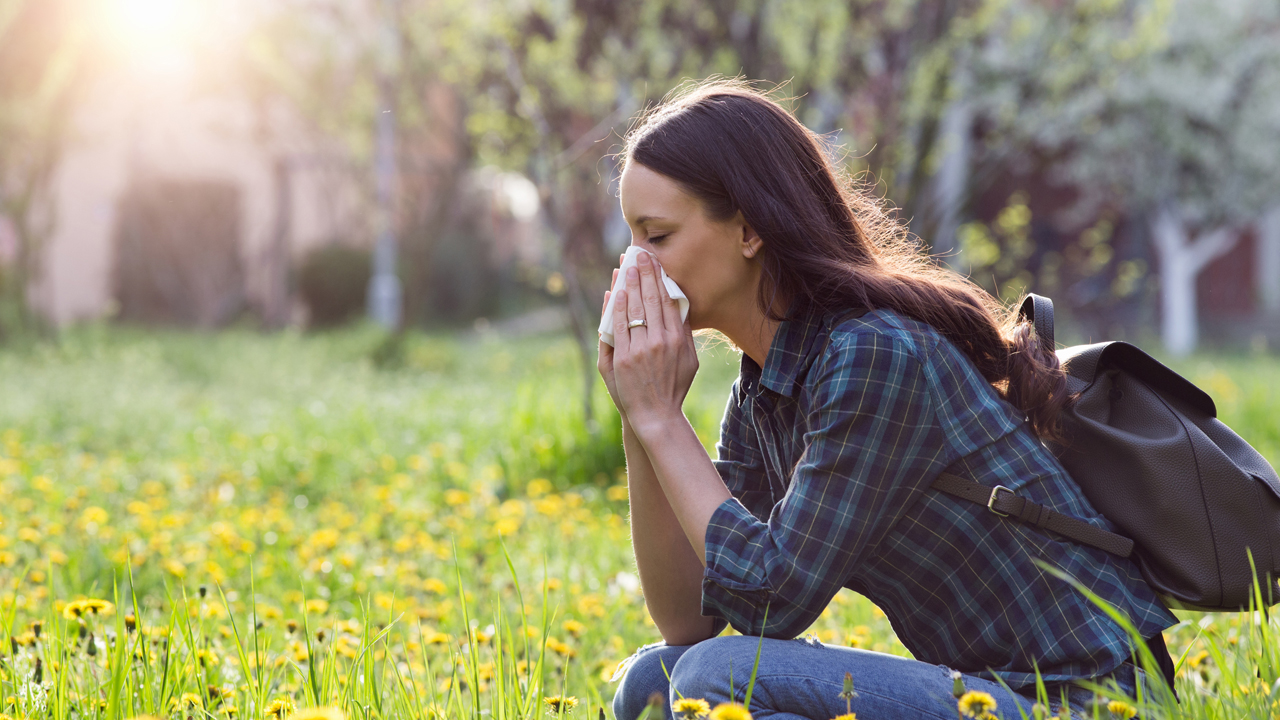In Healthy living
Follow this topic
Bookmark
Record learning outcomes
The incidence of hay fever is rising, and there have also been reports of longer, more severe allergy seasons. This inevitably leads to high demand for advice about appropriate products that will help to relieve common symptoms.
The most effective way to treat allergic reactions – including hay fever – is to identify what’s causing the reaction in the first place and reduce exposure to it if at all possible. In addition to pollen, common congestion and allergy triggers include animal dander, dust mites and, in some cases, work-related allergens such as wood dust.
Environmental irritants
If allergies or hay fever have been ruled out, it is also possible that someone presenting with nasal congestion is reacting to common environmental irritants.
Any number of substances and environmental conditions can cause symptoms, with common culprits including car exhaust fumes, cigarette smoke, cleaning products, weather fluctuations and spicy foods.
About 25 per cent of people with hay fever react to birch tree pollen, according to Allergy UK, and researchers have found that urbanisation and air pollution may make the symptoms even worse. This may explain why some people in urban areas don’t see the results they want from treatment, a recent study found. The authors recommend: “When greenery in cities is planned, allergenic trees should not be planted. Despite the fact that they can physiologically adapt to the local environment, they produce more stress proteins of a higher potential allergenicity.”
These findings align with other research suggesting that global warming and increased air pollution may contribute to more intense pollen seasons – and an increase in circulating airborne pollen particles – potentially making hay fever symptoms worse.
Claire Campbell, Olbas senior brand manager, says that with Mintel estimating that almost half of all adults suffer from an allergy (hay fever being the most common), pharmacy teams are invaluable when it comes to supporting people. She says: “Symptoms can range from fairly mild to severe and can be very debilitating for sufferers. In some cases, it can be quite isolating as they seek relief indoors when friends or family may wish to go outside and enjoy the summer weather.
“Anyone who has suffered an allergy can relate to how much it can impact your mood and general feeling. And with three in five adults agreeing that brands should offer advice on how to manage allergies, there is clearly consumer appetite for further education on this subject.”
A 2021 study from the University of Worcester suggests that climate change will increase the severity of the hay fever season in northwest Europe by up to 60 per cent unless carbon emissions are reined in. This will inevitably lead to a demand for allergy remedies.
“Finding products to successfully help manage symptoms will have a big impact on relieving the psychological effect of feeling stuffy and stuck indoors,” says Ms Campbell. “Relief products are very much need-driven, so it is important to consider all allergy symptoms when building your remedy offer.”
Not every sufferer wants to use a licensed medicine on a regular basis, says Paul Walsh, managing director of EM Pharma. “This could include patients looking for drug-free OTC alternatives, contact lens wearers seeking lens compatible products, or those seeking products to use in conjunction with their first line pharmaceutical treatment,” he says.
“Symptoms can range from fairly mild to severe and can be very debilitating for sufferers... it can be quite isolating as they seek relief indoors when friends or family may wish to go outside”
Pseudoephedrine clampdown?
This February, it emerged that the MHRA was looking at evidence to decide whether the rules on selling decongestant products containing pseudoephedrine needed to be tightened up, following reports of potentially serious side effects.
The European Medicines Agency announced a review of medicines containing pseudoephedrine, following concerns over the risk of PRES and RCVS, two conditions affecting blood vessels in the brain. A small number of cases have been reported in people taking pseudoephedrine-containing medicines. An MHRA spokesperson confirmed that the agency was reviewing the available evidence and would provide further advice as appropriate.
Michelle Riddalls, chief executive of consumer health trade body PAGB, says: “A routine safety review has been instigated at an EU level. This is in relation to a potential but extremely rare known side effect. Only two reports of PRES and RCVS have been reported in the UK and both cases were treated successfully.
“Warnings related to these concerns are already present on the product information in the UK. However, as is right, MHRA will also be making an assessment to see if any changes are needed in the UK. There are no immediate changes to medicines containing pseudoephedrine and any suggestions speculating the outcome of the MHRA review would be inappropriate and premature.”
Considering treatments
Deborah Evans, PAGB advisor, community pharmacist and Royal Pharmaceutical Society Fellow says: “There are many ways in which the symptoms of hay fever can be managed at home and with the help of medicines that are available from pharmacies.”
She notes that the specific types of pollen that cause hay fever can vary depending on the geographic area and the time of year, suggesting that customers should be advised to pay attention to local pollen counts and try to avoid spending time outdoors during periods when the pollen counts are high if they are susceptible to hay fever symptoms.
With regards to medication, Ms Evans adds: “Hay fever can be treated with antihistamines, decongestants, and nasal corticosteroids. In severe cases, immunotherapy may be recommended to reduce sensitivity to the allergens.
“There are different treatments available for blocked noses associated with hay fever, including decongestants and nasals sprays. Many decongestants should only be used for a few days to avoid a rebound reaction, which can make the congestion worse.”
“Many decongestants should only be used for a few days to avoid a rebound reaction, which can make the congestion worse”
Dealing with dry eyes
Research from the brand Rohto Dry Aid has found that one in two people in the UK could be suffering from dry eye, a condition which can lead to sight loss if left untreated. Moreover, 51 per cent of people have no idea what dry eye is and so might present in pharmacy looking for help with hay fever and allergy treatment when their problem isn’t caused by either condition.
Optometrist Francesca Marchetti explains: “Dry eye is a problem that’s increasing, yet there’s a real lack of knowledge surrounding the symptoms of the condition.
“It happens when you don’t produce enough tears or the consistency of the tear changes. This leads to inadequate lubrication of the tear film, with inflammation and likely damage to the eye surface.”
The condition can be caused by ageing, says Ms Marchetti, while environmental conditions can also play a part. Wind, cold weather, indoor air pollution and central heating, diet, certain medications and health conditions may also cause or exacerbate symptoms.
Even hormones can have an effect on eye health.
Views from the P3pharmacy panel:




